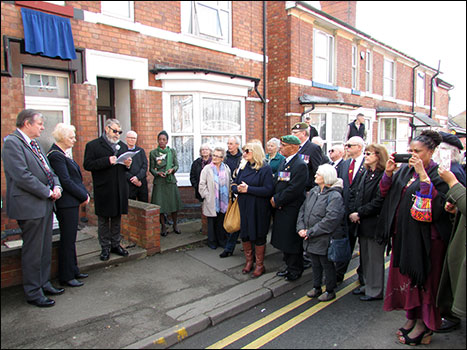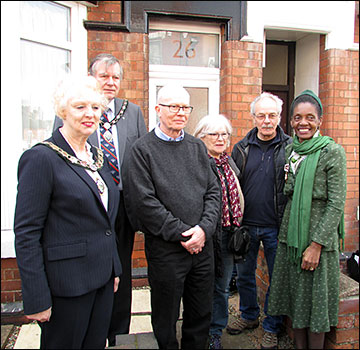Don Merrifield, chairman of the Rushden & District History Society, read out the details, watched by the Mayor of Rushden, Barbara Jenney and her consort (David Jenney), Deputy Lieutenant of Northamptonshire, Morcea Walker, MBE, together with three members of Walter's family. Others assembled were members of the history society, members of the British Legion, and several members of the public.
 |
|
Don Merrifield reads out the details before the plaque was unveiled
|
The weather was kind and people were happy to gather on the footpath in the sunshine opposite No 26. The event was also attended by BBC Look East, Radio Northampton and ET photographer.
Walter TULL
Don said: "We have gathered to celebrate, remember and commemorate the life of Walter Daniel John TULL, a pioneering black footballer and soldier who for several years lived right here at 26 Queen Street, Rushden.
"Walter’s family roots go back to the island of Barbados, where his father Daniel was born and his paternal grandparents were born into slavery.
"By the 1880’s Daniel, a carpenter, had moved to Great Britain to better himself. He settled in Folkestone where he met and married a farmer worker’s daughter Alice Palmer.
"Walter born on 28th April 1888 in Folkestone and was the youngest of three boys and had two sisters. Sadly another sister had died earlier.
"Tragically Walter’s mother Alice died whilst he was young, and so it was that he was brought up, initially, by step-mother Clara (Alice’s cousin – who had married Daniel); before being sent – together with his brother Edward - to the Children’s Home and Orphanage in Bethnal Green, London following the untimely death of his father (Daniel) in 1897. Hard times.
"At the Children’s Home Walter showed some prowess in the regular soccer games and represented the Home in competitive matches. He proved to be a skilful and determined centre-forward and showed his versatility in later years turning out in defence – as needed. He began to catch the eye of local football clubs. Aged 16 Walter was apprenticed to the Children’s Home Printing Department and moved out to lodge nearby.
"By now (1904) in Edwardian Britain Imperialism had brought massive opportunities for trade and wealth but also reinforced a system of class and social superiority marked by prejudices and stereotypes.
"Working for the Children’s Home Printing Dept. did nothing to dim Walter’s love of football and in his late teens he wrote to Clapton FC for a trial. Why Clapton? They were local, and successful – reaching the Amateur Cup Final many times. Walter was no slouch and established himself as a regular first team player age 20.
"In 1909, just before his 21st Birthday he played a crucial role in the Clapton’s 6-0 victory to lift the Amateur Cup again and shortly after he was signed as a professional for Tottenham. He was the third person of mixed heritage to play in the top division of the Football League, after Arthur Wharton of Sheffield United and Billy Clarke of Aston Villa.
"In 1911, Walter transferred to Northampton Town FC (The Cobblers) playing in his debut game on 21 October – and the Northampton Daily Echo reported that: Tull had a warm welcome from the crowd and had the privilege of kicking-off for his new club.’
"It was at this time that he moved to Rushden lodging with team mate Eric Tomkins. Walter found other interests in Rushden including being introduced to local cricket, probably by ‘Wassie’ Tomkins, where he was a good all-rounder and regularly turned out for the Rushden Thursday First XI and Rushden Town sides.
"Events in Sarajevo / the assassination of Archduke Franz Ferdinand of Austria sparking the outbreak of The Great war, impacted on the 1914-15 football season. Few people thought the war would last long / ‘Home by Christmas’ being the popular refrain, most people thought that the war would involve no more than the regular armies. Keep Calm and Carry On was the way forward. With this in mind and a desire to maintain morale of both soldiers and public it was decided to continue the football league. The opening games for Northampton Town saw Walter Tull in the regular line up along with people like Clipston, Freeman, Hughes, Lloyd-Davies however Walters thoughts of joining Glasgow rangers were put on hold as he had decided to ‘join up’ as soon as possible.
"In 1914 he enlisted in the 17th Battalion of the Middlesex Regiment, 1st Football (the footballer’s battalion) and fought in the Battle of the Somme in 1916. He was commissioned as a Second Lieutenant on 30 May 1917; the first black Briton to be commissioned as a combat officer. Tull fought in Italy in 1917–18, and was mentioned in dispatches for "gallantry and coolness" while leading his company of 26 men on a raiding party into enemy territory. As the first black infantry officer to lead troops, Walter preturned to France in 1918, and was killed in action on 25 March during the Second Battle of the Somme Spring Offensive; his body was never recovered, but his name is on a memorail at Arras in N. France. He was awarded the 1914-15 Star, British War and Victory medals.
"Like so many of his generation – who are remembered on War Memorials throughout the land and further afield – his life was swept away by the carnage of the Great War. His achievements are impressive by any standard – but made the more so in the courage he displayed fighting not only the enemy but the pervasive bigotry of Edwardian England sometimes on the terraces but also in the narrow minded military where a black man was seen as being incapable of command.
"We remember him, his life, his sacrifice with gratitude."
 |
|
After the unveiling
Rushden Mayor Barbara Jenney, her Consort David Jenney,
Ed Finlayson, Pat Justad and Duncan Finlayson, great nephews and great niece of Walter Tull, and
Deputy Lord Lieutenenant Morcea Walker, MBE.
|
Civic etiquette determines that the Deputy Lieutenant should have had the honour of pulling the cord, but she graciously allowed the relatives to do so. They are Ed and Duncan Finlayson and Pat, great nephews and great niece of Walter Tull, who had travelled from Scotland, especially for the Northampton event and were intent on coming to Rushden on Sunday to see the house at 26 Queen Street. In the event Paul (the house owner) invited them to come over early and hosted them with tea and coffee before the unveiling.